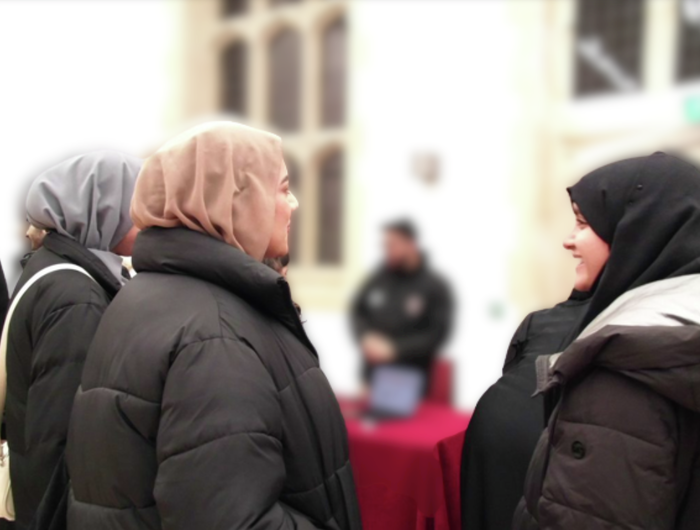‘A space for faith’: the Student Christian Movement
Reuben Baldwin spends an evening in reflection with Cambridge’s Student Christian Movement

In daytime, Michaelhouse chapel is the site of a high-traffic café serving generous brunches and indulgent cakes. But once the sun has set, and the students have set aside their work, the chapel becomes home to a small but growing community of progressive Christians, Heartsease.
Heartsease is recently affiliated with the nationwide organisation Student Christian Movement (SCM). The national mission is “progressive, student-led faith in action.” This spiritual community, having garnered a critical mass of adherents, is looking into uncharted territory: the early days are gone, the society is growing, the posters are in the college chapels. But the original, small-scale ethos of Heartsease remains a driving force.
What greets you at Michaelhouse on a Thursday evening is a cup of oat-milk hot chocolate and a warm welcome from Andrew, the genial and soft-spoken vicar of St. Clement’s. More students arrive and form chatting constellations over their drinks, until it is time to sit down in a circle and introduce themselves: name and pronouns.
“Any loving relationship with God comes with questioning”
Here the bedrock is laid for a protective environment. Anika, co-president of SCM Cambridge, calls it a “space for faith without judgement or fear” where progressive Christians can experiment with theology in confidence.
It is inter-denominational and LGBT-affirming: as members go around the circle with their pronouns, any equivocation over the place of LGBT people in the church is set aside. “Religious communities and LGBTQ+ communities can feel very separate”, says regular attendee Len. But here is a space to talk about his faith without worrying about that problematic barrier.
To some secular observers, SCM might simply represent an aspirational community for LGBT Christians. But this aspect is just the substratum of the spiritual community here, and sometimes, it is what else they have to say that is most interesting.
From the outset, it is clear that SCM wants to do more than provide a safe space for LGBT Christians. Besides the broader issues of faith in action, they have discussed political issues such as environmental activism and peace and reconciliation.
But SCM also aims to foster an inter-denominational spirit. At the end of each session, members can present a particular style of prayer: compline, praying out loud, silent contemplation. SCM rounded off last term with a mixture of worship music, from traditional hymns to modern songs and Taizé.
“Some Christian spaces are willing to tolerate LGBT people as a kind of open secret”
At the heart of this is an open environment – not only insofar as it touches on LGBT affirmation, but also as it approaches faith on the whole. “We’re not taking any liberties with God,” says Anika, “but any loving relationship comes with questioning.” SCM claims to be a safe space for Christians of a progressive bent to widen their spiritual horizons. Len finds that speakers introduce unfamiliar traditions and themes that broaden his conception of faith and inspire discussion.
But the protective walls of this space prove to be elastic. The world enters. The hot-chocolate conversations inevitably come to focus on the Archbishop of Canterbury’s latest statement on same-sex marriage, or Pope Francis’s call for homosexuality to be decriminalised.
Equally pressing, while spiritual leaders debate the bumpy road forward, is the secular offensive against transgender people in the UK. It is not enough to provide a safe space, since very real developments are taking place outside Michaelhouse at this very moment.
It is an exciting and nerve-wracking time to be an LGBT Christian, and the momentum gained by SCM’s membership certainly reflects this. But SCM is at an important juncture. It has nurtured a precious community that will no doubt be a valued part of the spiritual landscape in Cambridge – but its members do not necessarily know what to expect in the future.
At the end of the evening, a compline rounds things up. It is a reminder that essentially, their love of God remains heartfelt. This is the ethos: if Christians question the nature of their faith, their love of God will be ever more thorough. In this place, they can explore the reaches of this love, their mind at ease and their conviction sincere.
For SCM, the pace is accelerating, but members are called to reflection. Between the climate, church debates over same-sex marriage, and the heightening social crisis in this country, this is a time for faith in action. But setting this place of refuge in movement will likely be a tricky process.
“Some Christian spaces are willing to tolerate LGBT people as a kind of open secret,” says a gay student who has since left religion behind. Is it possible that SCM might be tolerated by more conservative Christians, but kept at an arm’s length? Will this safe space come to show its fangs?
 News / Clare Hall spent over £500k opposing busway 24 December 2025
News / Clare Hall spent over £500k opposing busway 24 December 2025 Comment / The ‘class’ of Cambridge24 December 2025
Comment / The ‘class’ of Cambridge24 December 2025 News / Eight Cambridge researchers awarded €17m in ERC research grants27 December 2025
News / Eight Cambridge researchers awarded €17m in ERC research grants27 December 2025 News / Caius mourns its tree-mendous loss23 December 2025
News / Caius mourns its tree-mendous loss23 December 2025 Comment / League tables do more harm than good26 December 2025
Comment / League tables do more harm than good26 December 2025









